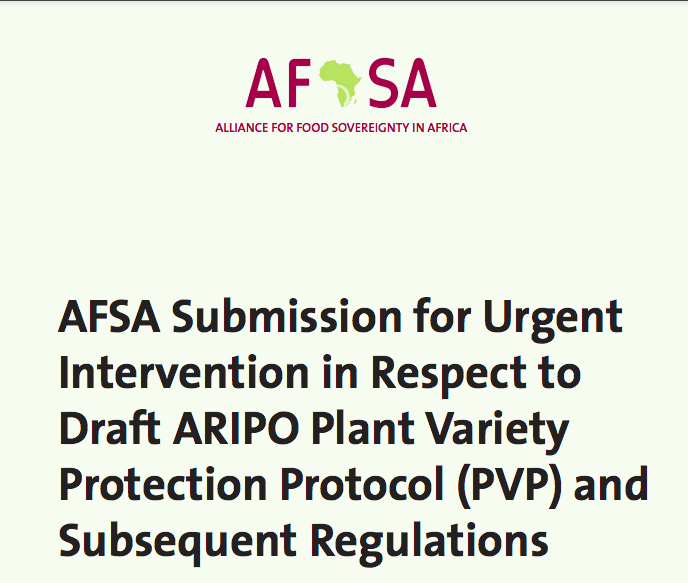Latest Resources

2 December 2022
Extractive tourism – a case study of biodiversity conservation in Tanzania, a legacy of gross hum...
This paper is part of a series of briefings by the African Centre for Biodiversity in the lead-up to the Convention on Biological Diversity’s (CBD) Fifteenth Conference of the Parties (COP 15) in December in Montreal, where a new deal – the Global Biodiversity Framework – will be finalised. In this paper, we deal with […]

2 December 2022
EXTRACTIVE TOURISM. A case study of biodiversity conservation in Tanzania, a legacy of gross huma...
This paper is part of a series of briefings by the African Centre for Biodiversity in the lead-up to the Convention on Biological Diversity’s (CBD) Fifteenth Conference of the Parties (COP 15) in December in Montreal, where a new deal – the Global Biodiversity Framework – will be finalised. In this paper, we deal with […]

1 December 2020
Multiple shocks and the Ebola and COVID pandemics in West and Central Africa: extraction, profite...
Veuillez cliquer ici pour le français. We are pleased to present the first discussion paper in our “Multiple Shocks in Africa Series”. The tragic story of the Ebola pandemic in West Africa, and the Ebola epidemic in the Democratic Republic of Congo (DRC) in particular, is not just one of disease emergence. It is fundamentally […]

29 May 2020
Profiteering from health and ecological crisis in Africa: The Target Malaria project and new risk...
Cliquez ici pour le français The ACB shares this research paper with you, of the wave of ‘Trojan horse’ second-generation genetic engineering strategies targeted at, inter alia, malaria in Africa, at a time when the COVID-19 crisis is fracturing the myth that global health expertise is the domain of North America and Europe. Global health […]

17 September 2018
The SADC PVP Protocol: Blueprint for uptake of UPOV 1991 in Africa
In the recently published discussion paper, ‘The SADC PVP Protocol: Blueprint for uptake of UPOV 1991 in Africa’, Sabrina Masinjila and Mariam Mayet, provide an updated critique on the regional Plant Variety Protection (PVP) system developed under the auspices of the Southern African Development Community (SADC) – the SADC PVP protocol – adopted by the […]

1 September 2017
WEMA Project shrouded in secrecy: open letter to African governments to be accountable to farmers...
The Water Efficient Maize for Africa (WEMA) project promises to develop drought tolerance in maize for the benefit of small holder farmers, but is really a project designed to facilitate the spread of hybrid and genetically modified (GM) maize varieties on the continent. WEMA involves five African countries: Kenya, Mozambique, South Africa, Tanzania and Uganda. […]

11 June 2014
AFSA Makes Small Gains for Farmers’ Rights in Draft SADC PVP Protocol
AFSA members participated at a SADC Regional Workshop that took place 13-14 March 2014, in Johannesburg, South Africa. The aim of the workshop was to review the draft SADC PVP Protocol. After marathon, highly contentious and difficult discussions, AFSA members were able to persuade member states to amend key provisions in the draft SADC PVP […]

28 October 2010
Synthetic Biology in Africa: Recent Developments
By Gareth Jones and Mariam Mayet The focus of this paper is the emerging field of synthetic biology, in particular its implications for the African continent. Synthetic biology combines a number of scientific disciplines and is generally understood to involve the deliberate design of biological systems, using standardised components that have been created in a […]

14 May 2010
A good neighbour? South Africa forcing GM maize onto African markets and policy makers
Since the beginning of 2010, South Africa’s Executive Council responsible for GMO permit approvals has granted export permits for almost 300,000 Metric Tons (MT) of GM maize to be exported to Kenya, Mozambique, and Swaziland collectively, and 35,000 MT of GM soybean to Mozambique.1 Despite South Africa being Africa’s largest producer of maize, and a […]

28 September 2009
Patents, Climate Change and African Agriculture: Dire Predictions
Uncertainty and apprehension often afford opportunity to the cunning. This is certainly the case with climate change. The multinational seed and agrochemical industry see climate change as a means by which to further penetrate African agricultural markets by rhetorically positioning itself, even if implausibly, as having the solution to widespread climate concerns. Their so-called “final […]
